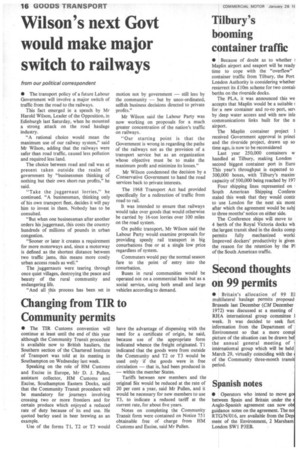Wilson's next Govt would make major switch to railways
Page 18

If you've noticed an error in this article please click here to report it so we can fix it.
from our political correspondent • The transport policy of a future Labour Government will involve a major switch of traffic from the road to the railways.
This fact emerged in a speech by Mr Harold Wilson, Leader of the Opposition, in Edinburgh last Saturday, when he mounted a strong attack on the road haulage industry.
"A rational choice would mean the maximum use of our railway system," said Mr Wilson, adding that the railways were safer than road traffic, caused less pollution and required less land.
The choice between road and rail was at present taken outside the realm of government by "businessmen thinking of nothing but their own short-run profits," he said.
"Take the juggernaut lorries," he continued. "A businessman, thinking only of his own transport fleet, decides it will pay him to invest in them. Nobody has to be consulted.
"But when one businessman after another orders his juggernaut, this costs the country hundreds of millions of pounds in urban congestion.
"Sooner or later it creates a requirement for more motorways and, since a motorway is defined as the shortest distance between two traffic jams, this means more costly urban access roads as well."
The juggernauts were tearing through once quiet villages, destroying the peace and beauty of the rural community and endangering life.
"And all this process has been set in motion not by government — still less by the community — but by unco-ordinated, selfish business decisions directed to private profits."
Mr Wilson said the Labour Party was now working on proposals for a much greater concentration of the nation's traffic on railways.
"Our starting point is that the Government is wrong in regarding the paths of the railways not as the provision of a transport service but as an organization whose objective must be to make the maximum profit and minimize its losses."
Mr Wilson condemned the decision by a Conservative Government to hand the road services back to private interests.
The 1968 Transport Act had provided specifically for a redirection of traffic from road to rail.
It was intended to ensure that railways would take over goods that would otherwise be carried by 16-ton lorries over 100 miles on the road system.
On public transport, Mr Wilson said the Labour Party would examine proposals for providing speedy rail transport in big conurbations free or at a single low price regardless of system.
Commuters would pay the normal season fare to the point of entry into the conurbation.
Buses in rural communities would be operated not on a commercial basis but as a social service, using both small and large vehicles according to demand.




























































































